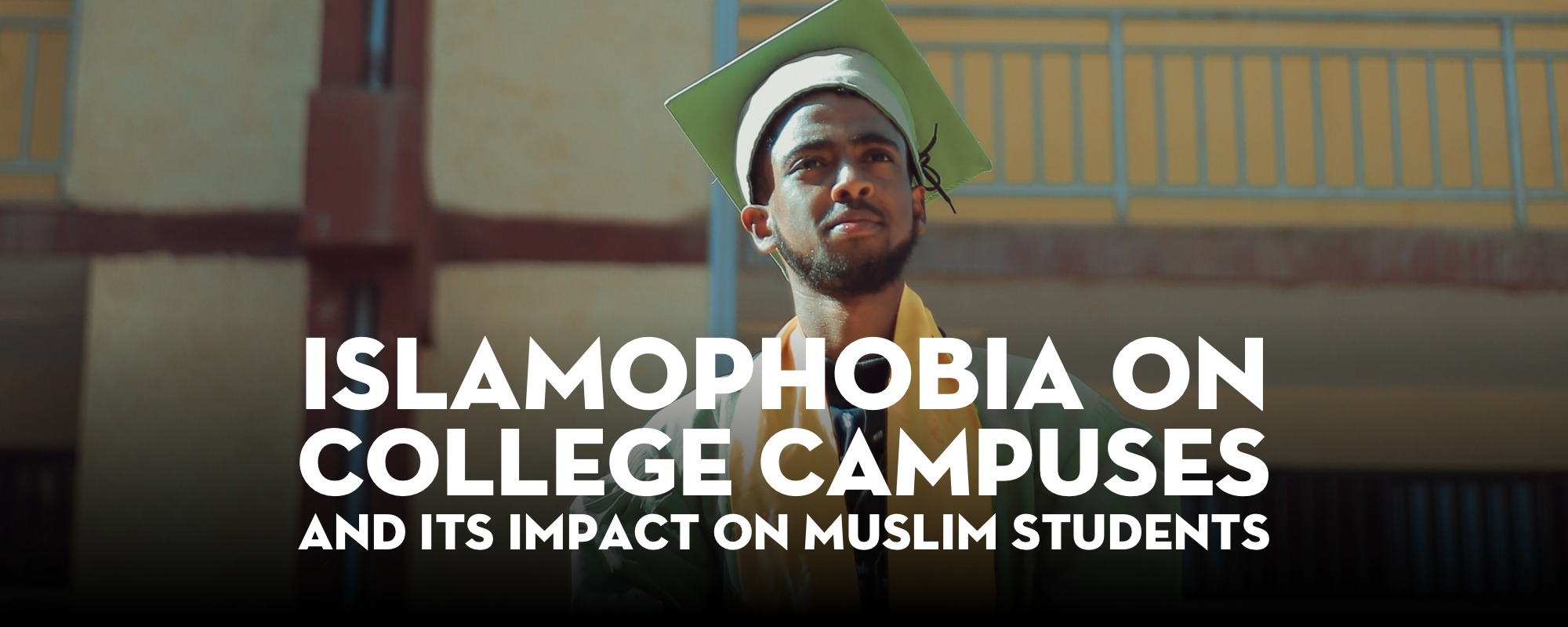
In this report, the California Chapter of the Council on American-Islamic Relations (CAIR-CA) presents its analysis of a 2019-2020 college campus climate survey of American Muslim college and university students.
The survey was administered to students at over sixty institutions of higher learning primarily throughout the state of California, including both public and private universities and colleges. Its purpose is to examine the lived experiences of American Muslim college students and the issues they face, particularly as a consequence of their real or perceived Muslim identities.
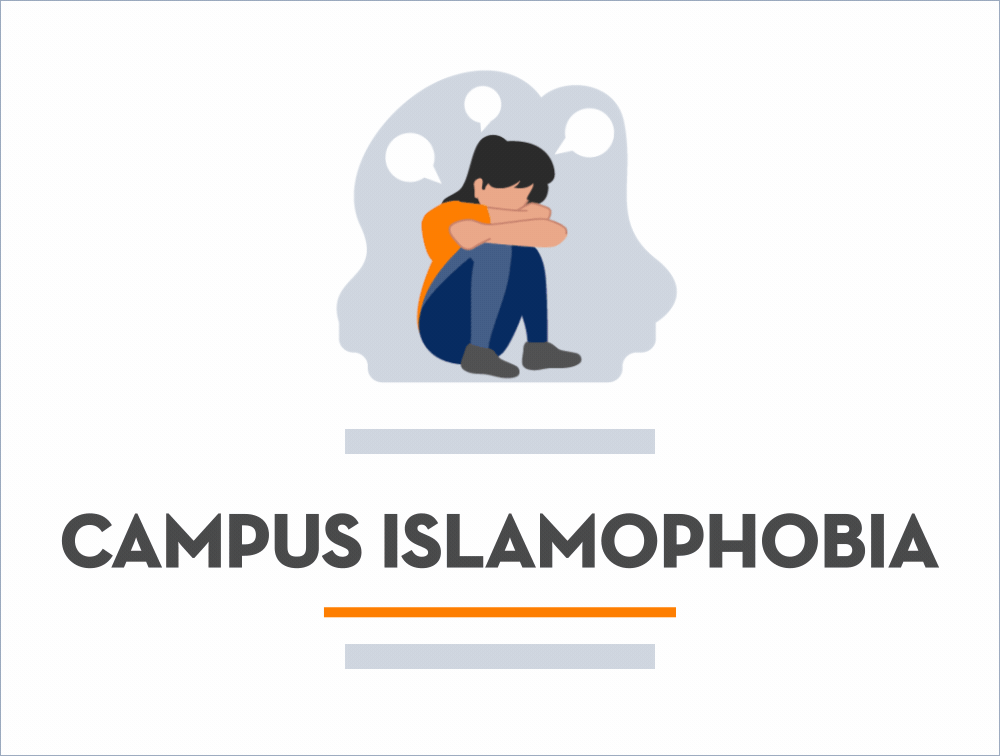
Islamophobia is a fear, hatred, or prejudice toward Islam and Muslims that manifests itself in a pattern of discrimination and oppression.13 These harmful patterns are rooted in a distorted set of stereotyped characteristics that paint the nearly 2 billion diverse Muslims around the world as a monolith of "violent, civilization subverting" others.14 Islamophobia is manifested by religious and racial animosity that is both perpetuated by private citizens and cultural and political structures.15
At the individual level, CAIR-CA has received complaints from Muslim community members across the state who have experienced physical attacks or harassment, or from local mosques and Islamic centers who have been the victims of vandalism. At a systemic and governmental level, Islamophobia has manifested itself in the creation and enforcement of anti-Muslim laws and policies that directly or indirectly lead to the curtailment of Muslim civil rights and civil liberties.16 Some examples include the Muslim Ban, anti-Shariah legislation, surveillance practices, and a myriad network of other national and foreign policy measures.17
Unfortunately, under the current Presidential administration, anti-Muslim bigotry and Islamophobia have become pervasive features of American public life. Whether in formal politics, national media, or on an individual level, harmful stereotypes, anti-Muslim animus, and racial antagonism are dangerously commonplace. This national context of Islamophobia and fear-mongering has unsurprisingly permeated college campuses across the country.
Islamophobia manifests itself on college campuses in three major ways: First, Muslim students are victims of targeted harassment or discrimination either by fellow students, professors, or outside organizations and speakers because of their religious identity. This harassment and discrimination can come in various forms including verbal, online, or physical attacks. This targeted harassment and discrimination is often exacerbated by inadequate responses by campus administration to such attacks. Second, Muslim students face feelings of discomfort and vulnerability for several reasons on campus, including a lack of representation in academic courses and finding themselves the targets of speech and viewpoint suppression especially as it pertains to pro-Palestinian advocacy. Third, college administrators often fail to provide reasonable religious accommodations that serve the unique requirements of Muslim students including access to adequate prayer space and halal food options.
Addressing the three major issues Muslim college students face will take a concerted effort by administrators, educators, lawmakers, community members, and community organizations to ensuring positive campus climates and reducing feelings of otherness and discomfort among Muslim college students.
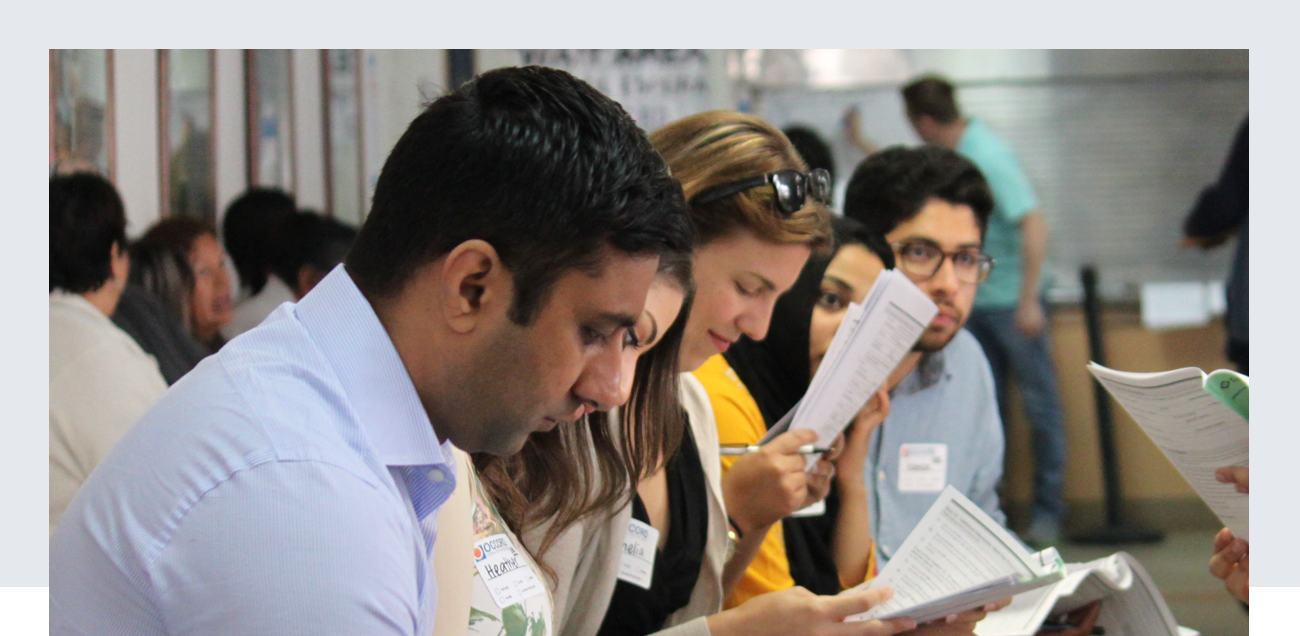
CAIR-CA has engaged in direct legal services and advocacy efforts across the state in combating Islamophobia and other forms of discrimination on college campuses. Specifically, over the past several years, CAIR-CA has:
PROVIDED DIRECT LEGAL SERVICES TO STUDENTS WHO HAVE BEEN SUBJECTED TO RELIGIOUS BASED DISCRIMINATION AND OR HARASSMENT FROM ACADEMIC INSTITUTIONS, INDIVIDUALS, AND EXTERNAL ACTORS.
PROVIDED STUDENTS WITH THE KNOWLEDGE TO COMBAT SUCH DISCRIMINATION AND HARASSMENT THROUGH KNOW YOUR RIGHTS PRESENTATIONS AND WORKSHOPS.
WORKED TO CREATE MORE INCLUSIVE CAMPUS ENVIRONMENTS BY IDENTIFYING AND COUNTERING ISLAMOPHOBIC ACTORS THAT PERPETUATE ANTI-MUSLIM IDEAS ON CAMPUS AND PUSHING FOR COURSES AND CAMPAIGNS THAT COUNTER ISLAMOPHOBIC EFFORTS.
RESPONDED TO ATTEMPTED CENSORSHIP OF COLLEGE STUDENTS ADVOCATING ON BEHALF OF PALESTINIAN RIGHTS.
ADVOCATED TO COLLEGE ADMINISTRATORS FOR RELIGIOUS ACCOMMODATIONS.
First, CAIR-CA has dedicated resources to combating Islamophobia and religious-based discrimination both by providing direct legal services and through empowering college students with the knowledge they need to combat such actions.
For example, CAIR-SFBA attorneys assisted a student at California State University Maritime (CSU Maritime) in Vallejo facing multiple distressing incidents on campus including an uninvestigated assault and Islamophobia directed at her by a college administrator. The student, a hijab-wearing Muslim woman at a campus was attacked by an assailant on campus while she was walking to her classes. The male assailant menacingly approached her and yelled "I'm going to kill you." The student identified the assailant as a fellow student on campus and reported the crime to campus police and security, hoping to receive a thorough investigation as well as potentially a safety escort.
Despite the student's due diligence in reporting, she was not taken seriously and the suspect in question was not searched for or identified, leading to serious distress for the student and a feeling that she was physically unsafe on campus. Additionally, during this time, a campus administrator responsible for assisting and supporting victims of potential gender-based violence and harassment further traumatized the student by stating that she believed that Islamic teachings encouraged and condoned violence against women.

CAIR-SFBA stepped in to counsel the student and send a demand letter on her behalf to campus administrators informing them that they were in violation of California State University policies and guidelines by failing to undertake necessary steps to conduct an investigation that allows for identification of the alleged perpetrator. Moreover, the letter demanded that CSU Maritime campus conduct an immediate internal review of their reporting mechanisms to ensure that they were transparent, easy to use, and effective in ameliorating incidents involving harassment and discrimination stemming from university employees. In response, CSU Maritime administrators worked with campus police to conduct a thorough investigation and to provide personal security to the student. In addition, CAIR-SFBA offered to conduct implicit bias and cultural competency trainings for educators and administrators to ensure that they are attentive to the needs and sensitivities of Muslim students.
Second, CAIR-CA offices across the state have also
presented several Know Your Rights (KYR) talks to
Muslim Student Associations.
These presentations engage
Muslim college students
and provide them with the
knowledge they need to
combat Islamophobia on
campus. These presentations
inform college students of
their legal rights to a campus
free of discrimination and
harassment; that campuses
must develop and utilize
effective mechanisms for
students to report such harmful
incidents; that campuses must
respond to and investigate
such complaints; students'
rights to be given reasonable
religious accommodations by
their schools; and students'
rights to engage in protests,
advocacy work and other forms
of protected speech.
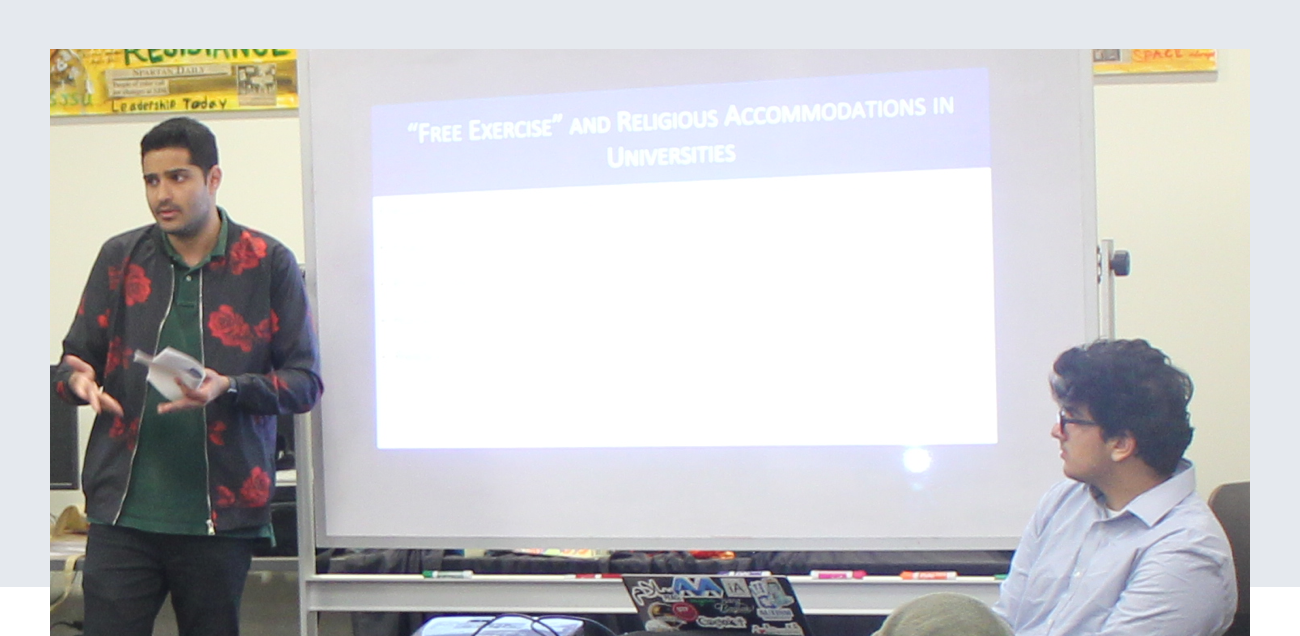
Third, CAIR-CA has combated
incidents of Islamophobia
and anti-Muslim bigotry on
campuses perpetuated by professors, administrators
and outside organizations. For example, CAIR-LA was
made aware of an Islamophobic course offered at a
local university through an organization called the Osher
Lifelong Learning Institute. The course was titled "History
of Islam: Mohammed to ISIS" and was taught by an
individual who had no academic credentials or training
to teach such a course. The instructor relied on sources
from known Islamophobes and anti-Muslim activists
such a Brigitte Gabriel and Ayaan Hirsi Ali. A cursory review of the course materials revealed that the course
was marketed and masqueraded as an academic class
in order to promote the instructor's racist, bigoted, and
Islamophobic worldview. For example, the slides used
in the class implied that Islam is a religion whose core
is violence and an inherent hatred of Jewish people.
Additionally, the course slides employed racist and
oriental tropes. Specifically, one of the slides stated
that Arabs are not a moral people and that "lying and
cheating" are commonplace among Arabs because
Arabs are all about "exploiting possibilities." CAIR-LA
sent a letter to the school demanding that the course be
discontinued and that the university develop a selection
and review process to ensure that no such hateful and
bigoted courses are taught at the university's campus
under the guise of a legitimate academic course. Based
on CAIR-LA's advocacy work, the school cancelled the
course and agreed to implement internal review systems
of any third-party taught courses.
In an ongoing effort to promote and advance academic
integrity, CAIR-SFBA supported Dr. Rabab Abdulhadi,
chair of the Arab and Muslim Ethnicities and Diaspora
Studies (AMED) program at San Francisco State
University (SFSU). CAIR-SFBA attended meetings with
the President of SFSU, Lynn Mahoney, to ensure that
there is adequate funding, staffing and advertising for
the one of a kind program chaired by Dr. Abdulhadi. The
cutting of AMED classes and inability to provide full time
faculty remains troubling and has caused low student
enrollment and an inability for the program to grow and
thrive, as intended by Dr. Abdulhadi's Pro-Israel Zionist
detractors. CAIR-SFBA, as a member of the Friends of
AMED Committee, advocated for a reversal of SFSU's
decision to delist AMED courses and force Dr. Abdulhadi to
teach introductory courses outside her area of academic
research. Alongside CAIR-SFBA, faculty members,
academics, students, and community members have also
been vocal in criticizing SFSU administration for denying
Dr. Abdulhadi, who suffers from permanent disabilities,
necessary teaching accommodations. These included
refusals to accommodate her requests for online teaching
despite strong medical recommendations and to provide
her security on campus, given the smear campaigns and
death threats Dr. Abdulhadi faced for scholarship and
Palestine-related advocacy.18

Fourth, CAIR-CA has worked to combat efforts by
administrators and outside organizations to censor
the Palestinian-rights advocacy in which many Muslim pressured college students and college administrators
to create an environment of fear on college campuses
to deter the free expression of Palestinian advocacy.
College students often fear real repercussions both from
their own college administrations and from these outside
organizations.19 Such actions are intended to have a
chilling effect on student activists.
CAIR-CA has seen a recent increase in baseless Title VI20
complaints filed against various campuses across the
state. The Title VI complaints have been filed with the
Department of Education (DOE) against schools alleging
that speech critical of Israel is anti-Semitic and creates
a hostile environment for Jewish students. The impetus
for these Title VI complaints comes from a small group
of staunchly Israel-aligned off-campus organizations
that aim to combat what they call "anti-Israelism" on
campuses. In addition to promoting favorable views of
Israel, these organizations seek to silence discussion on
the issue of Palestinian human rights. A primary tool in this
effort is to mislabel as "anti-Semitic" what is legitimate
political speech that criticizes the Israeli government's
discriminatory policies. These investigations are in line
with a larger effort to silence any individuals or groups
on US campuses who voice support for the dignity and
self-determination of Palestinians, opposition to Israeli
policy or politics, or opposition to Israel's discriminatory
apartheid practices against Palestinians. Palestinian
rights activists are themselves often targets of racist,
derogatory, and sometimes violent threats.21
Furthermore, the use of meritless civil rights complaints
has been a tool for pro-Israel actors because, even when
rejected, these complaints create the desired outcome of
exposing university administrators to bad publicity and
intimidating students into refraining from activism in order
to avoid "getting caught up in a civil rights complaint"
that is "not a good way to build a resume or impress a
future employer".22
In response to such investigations and other forms of
outside pressure to quash pro-Palestinian advocacy,
college administrators often issue public statements or
take actions which conflate any critique of the Israeli state
or anti-Zionist stances as anti-Semitic. By conflating
the critique and discussion of a political ideology and
project with anti-Semitism, college administrators,
whether intentionally or not, play into efforts to silence
any individuals or groups on U.S. campuses who voice
opposition to Israeli policy or politics, opposition to Israel's
discriminatory apartheid practices against Palestinians,
or support for the dignity and self-determination of
Palestinians. These attacks are antithetical to the value of
universities as spaces for individuals with diverse views
and backgrounds to meet and discuss and debate their
opinions and knowledge, in order to form better mutual
comprehension and more nuanced understandings. By
making criticism of Israel taboo, politically motivated
Zionist organizations seek to limit critical thinking and
intellectual growth on college campuses in California and
across the country.
To combat these efforts, CAIR-CA has monitored the
ongoing DOE investigations, the responses by campuses
to these investigations, and engaged in advocacy
campaigns to ensure college campuses do not engage
in the silencing of pro-Palestinian activism. CAIR-CA
has worked to foster an educational environment where
students of all racial backgrounds, national origins and
political persuasions are free to voice their political
viewpoints without fear of reprisal.
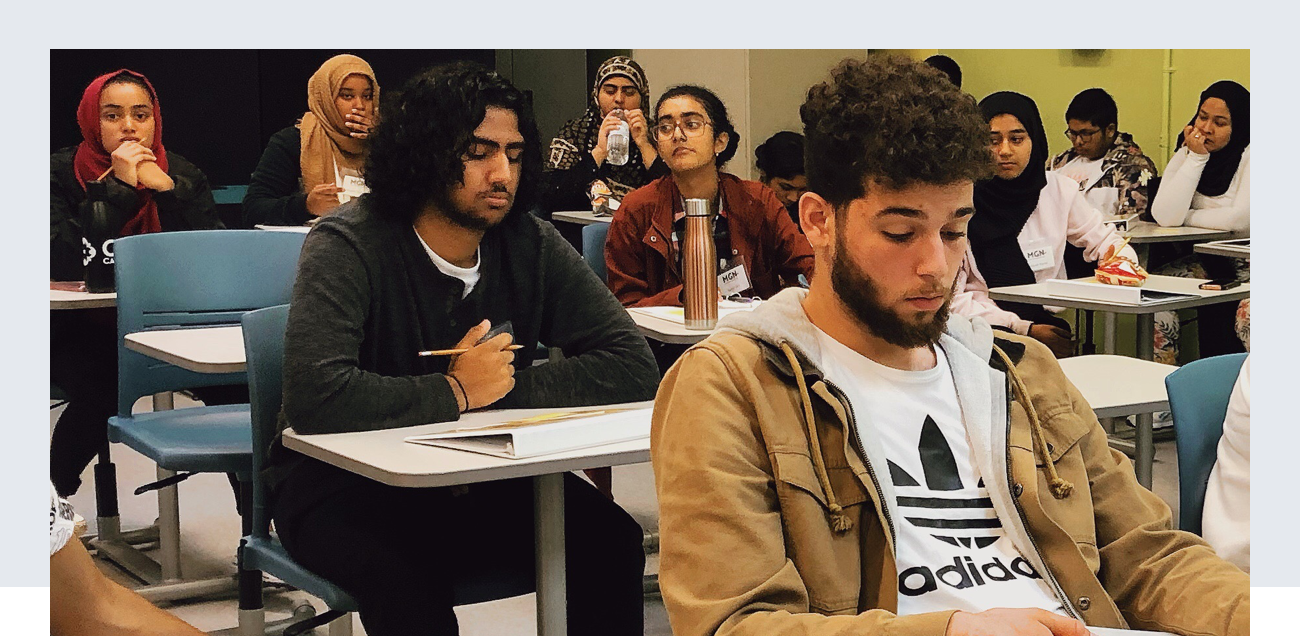
For example, recently the DOE opened two investigations into complaints made against the University of California, Los Angeles ("UCLA"). Specifically, on January 3, 2020, the DOE opened an investigation into a complaint filed against UCLA by StandWithUs, a rightwing, pro-Israel group. This complaint focused on UCLA's handling of student concerns over a May 14, 2019 guest lecture on "Islamophobia and the attacks against Palestine organizing and scholarship" by Dr. Rabab Abdulhadi. The complainants alleged that the class at issue was anti- Semitic, harassing, and discriminatory towards Jewish students. UCLA conducted its own internal investigation and found that the allegations were baseless. However, this did not stop the DOE from investigating the course. The DOE is also investigating a second complaint filed in November 2018 by the Zachor Legal Institute regarding the 2018 National Students for Justice in Palestine Conference, which was hosted by UCLA's Students for Justice in Palestine on UCLA's campus. The complaint came after a months-long pressure campaign demanding that UCLA infringe on students' free speech rights by canceling the conference. In response to these complaints, CAIR-LA coordinated with 20 partner organizations to apply pressure on the Chancellor of UCLA urging him to refute the baseless investigations and to issue a public statement reiterating the same. The letter to UCLA made clear that giving credence to false allegations of anti-Semitism not only trivializes the phenomenon, but also impedes efforts to counter serious instances of dangerous anti-Semitism and anti-Jewish hatred when they occur, such as vandalism of temples and synagogues as well as attacks on Jewish students on campus.

In another instance, CAIR-SFBA worked alongside
Palestine Legal, Jewish Voice for Peace, and the US
Campaign for Palestinian Rights to pressure UC Berkeley
Chancellor Carol Christ and the university to address the
systemic harassment Palestinian and Muslim students
and their allies faced. The advocacy efforts highlighted
the physical and verbal attacks students experienced on
and near campus in the aftermath of a campaign by a
student senator to censor and malign a photo display by
the student group Bears for Palestine. The Associated
Students of the University of California (ASUC) senator
also tried to intimidate a Palestinian student who opposed
the censorship efforts by threatening to add her to the
Israel-aligned blacklisting site Canary Mission. After
the censorship resolution was voted down at an ASUC
meeting in February, an anonymous student took to the
floor to announce his plans to join the Israeli military in order to kill Palestinians, saying, "I plan, after I graduate, on joining the IDF to eliminate Palestinian nationalism and Palestinians from the world." After making the
statement, the student suddenly fled the room, leaving
other students worried for their physical safety. This
threat was just the tip of an iceberg of harassment
Palestinian students and other allies faced on campus
that semester. Multiple students reported generally
fearing for their safety and going out of their way to
establish impromptu systems to protect each other,
including escort systems, taking time and energy that
would otherwise have been spent preparing for exams
and completing assignments. CAIR-SFBA and its allies
worked to support Palestinian students and their allies
in making demands on UC Berkley including institutional
representation, training on Islamophobia for students and
staff, and a public condemnation of the Canary Mission
blacklist as a threat to student safety, freedom of speech,
and academic freedom. CAIR-SFBA and its allies have
continued to apply pressure on UC Berkley to meet the
students' needs and to ensure equal access to education
in a safe campus environment.
Fifth, CAIR-CA has worked closely with Muslim Student
Associations and other student organizations to
collaborate with universities to advocate for reasonable
religious accommodations such as available prayer
space, increased halal food options, cross-cultural
centers that can serve the unique needs of Muslim
students, time off for religious holidays, and schedule
changes to accommodate for Ramadan.